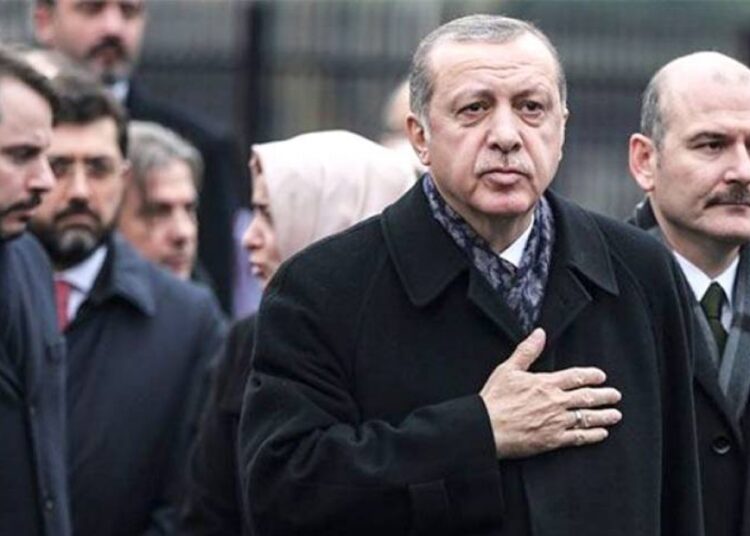Levent Kenez/Stockholm
The Global Organized Crime Index 2023, recently released by the Global Initiative Against Transnational Organized Crime (GI-TOC), has shed light on the longstanding and intricate connections between organized crime and individuals embedded within the Turkish state. Allegations in the report, dating back decades, suggest that the Turkish government leveraged various criminal markets for its own benefit and political objectives. The markets implicated include gold and the oil trade, human smuggling and arms trafficking.
Depending on the prevailing political circumstances and geopolitical relations with other countries, the Turkish government is rumored to tighten or ease its grip on organized criminal activities. Disturbingly, despite serious allegations of corruption in government contracts and the involvement of state officials in criminal activities, judicial action or investigations into these matters is rarely initiated.
Beyond the political elite, suspicions extend to law enforcement and customs officials who are believed to have links to the aforementioned criminal markets.
The report also claims that mafia-style groups in Turkey, closely modeled on traditional mafia organizations, have cultivated extensive connections with government officials and politicians, which, in some cases, seem to shield them from law enforcement and judicial scrutiny. However, these groups risk falling out of favor if their actions draw too much attention.
Loose criminal networks are active in specific regions of Turkey, engaging in a variety of cross-border smuggling activities, ranging from narcotics to migrants. Recent years have witnessed a surge in their capacity and influence as well as their collaboration with criminal networks in neighboring countries and beyond. These ad hoc networks mirror the evolving nature of both legal and illicit trade, thriving in security vacuums exacerbated by systemic corruption.
While domestic criminal actors dominate organized crime in Turkey, foreign criminals have also made inroads, particularly in cross-border smuggling involving migrants, drugs, weapons and human trafficking. Their operations are primarily concentrated along the nation’s land borders, with a significant degree of collaboration between foreign and domestic organized criminals. The influx of foreign mafia groups and illegally armed entities, including terrorist organizations engaging in organized criminal activities, has escalated due to the spillover effects of conflicts in neighboring nations, leading to their increased prominence in trafficking and smuggling operations in Turkey.
Remarkably, many criminal networks and state-embedded actors involved in these illicit markets allegedly use legitimate businesses to launder their ill-gotten gains and cloak their criminal activities. Additionally, some individuals within the legitimate private sector are rumored to have been drawn into certain criminal activities, enticed by the prospects of quick and substantial profits.

Ironically, around the time of the report’s release, a well-known mob boss, Ayhan Bora Kaplan, allegedly linked to the former Turkish interior minister Süleyman Soylu, was arrested while attempting to leave the country
Kaplan, who faced a court hearing on September 12, was accused of “forming a criminal organization,” “intentional injury,” “armed robbery,” “deprivation of liberty” and “torture.”
The Ankara Chief Public Prosecutor’s Office released a statement regarding these detentions and arrests, mentioning that efforts are underway to investigate other alleged crimes connected to this criminal organization.
Apart from Soylu, Kaplan’s alleged network involved a group of corrupt officials, including, former Ankara police chief Servet Yılmaz and former Ankara chief public prosecutor Yüksel Kocaman, who allegedly collaborated to protect Kaplan from law enforcement agencies and obstruct criminal investigations into him.
During Soylu’s time in office, Turkey faced allegations of involvement in international drug trafficking, largely linked to Turkish mob boss Sedat Peker. In 2021 Peker made dramatic claims in videos, accusing Soylu and other high-ranking officials of protecting and aiding cocaine trafficking networks.
Last year’s Global Organized Crime Index also mentioned Turkey’s complex ties between state-embedded individuals and organized crime. The report noted Turkey’s role in heroin production and trafficking, decreasing cooperation with the US Drug Enforcement Administration (DEA), a growing illegal arms trade and concerns about human trafficking.
With President Recep Tayyip Erdogan’s recent re-election and a cabinet reshuffle, there is speculation that the new leadership in the Interior Ministry may not provide the same level of protection to cocaine traffickers as was allegedly the case during Soylu’s tenure. The situation continues to develop as the investigation progresses.
However, it would be incorrect to infer that this means Erdogan will engage in a fight against the mafia. Nordic Monitor previously reported that over the past decade Turkey, under Erdogan’s administration, has become a destination where organized crime figures, including internationally recognized and notorious mafia leaders, have found it relatively straightforward to conceal their ill-gotten wealth, often utilizing state banks. There have been credible allegations of senior political leaders enriching themselves through undisclosed commissions associated with these money transfers.
The mechanism employed by the Erdogan government to attract illicit funds as well as legally obtained but undeclared wealth is referred to in Turkish law as the “wealth amnesty,” or “varlık barışı” in Turkish. The wealth amnesty legislation has been passed multiple times in the Turkish parliament, thanks to President Erdogan’s majority control of the legislative body. The most recent adoption of such an amnesty occurred last year when an amendment to a bill was presented to parliament’s agenda by Erdogan’s ruling Justice and Development Party (AKP).
At the time lawmakers were debating Law No. 7417, which introduced changes to public employment payroll calculations. It had nothing to do with the wealth amnesty.
There was a total lack of transparency and a deliberate attempt to avoid scrutiny regarding the wealth amnesty amendment in the parliamentary process. The bill did not contain any provision for such an amnesty, and no amendments related to it were proposed or discussed in the relevant parliamentary committee before it reached the floor for a vote. The apparent goal was to sidestep any discussion of potential money laundering allegations or controversial aspects of the amendment.
The report also touches on Turkey’s existing cooperation agreements and international treaties related to organized crime, which largely reflect its historical alignment with Western allies. Despite having extradition treaties with numerous countries, there are growing concerns regarding how the Turkish government employs these procedures. In recent years Turkey has been criticized for submitting a rising number of INTERPOL Red Notices for political purposes, particularly to target journalists, activists and political opponents living abroad, despite ongoing efforts at international collaboration.












